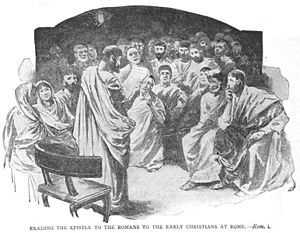From the Book of Exodus:
When Moses’ father-in-law saw all that he was doing for the people, he said, “What is this that you are doing for the people? Why do you sit alone, while all the people stand around you from morning until evening?” Moses said to his father-in-law, “Because the people come to me to inquire of God. When they have a dispute, they come to me and I decide between one person and another, and I make known to them the statutes and instructions of God.” Moses’ father-in-law said to him, “What you are doing is not good. You will surely wear yourself out, both you and these people with you. For the task is too heavy for you; you cannot do it alone.”
(From the Daily Office Lectionary – Exodus 18:14-18 (NRSV) – May 5, 2014.)
 Apparently Moses didn’t learn anything from his experience at the battle with Amelek when he needed Aaron and Hur to hold up his hands, so his father-in-law Jethro has to remind him that he can’t do it all alone and that, if he tries to do so, he will wear himself out. Smart man, Jethro!
Apparently Moses didn’t learn anything from his experience at the battle with Amelek when he needed Aaron and Hur to hold up his hands, so his father-in-law Jethro has to remind him that he can’t do it all alone and that, if he tries to do so, he will wear himself out. Smart man, Jethro!
Jethro’s recommendation is that Moses create a hierarchy: “Look for able men among all the people, men who fear God, are trustworthy, and hate dishonest gain; set such men over them as officers over thousands, hundreds, fifties and tens. Let them sit as judges for the people at all times; let them bring every important case to you, but decide every minor case themselves.” (vv. 21-22) Essentially, Jethro is suggesting what has become known as decentralization or subsidiarity in which matters are to be handled at the lowest possible level of the hierarchy by the least centralized authority capable of addressing them effectively; a matter beyond the competency of the authority is referred upward and only the most serious of matters come to the highest level.
This is good advice and a workable solution to the problem of Moses’ potential exhaustion, but another factor is not addressed, and that is the matter of collegiality. Even with a hierarchical organization and application of subsidiarity, the leadership at the highest level can burn out without sufficient collegial support. This is why bishops in the Episcopal Church are required by canon law to have councils of advice, standing committees and diocesan councils, and it is why the church should also have colleges of presbyters.
When a priest is ordained in the Episcopal Church among the charges he or she is given is “to work as pastor, priest, and teacher, together with your bishop and fellow presbyters, and to take your share in the councils of the Church.” (BCP 1979, page 531) This means more than working with the vestry and taking part in the annual diocesan convention. Among other things, it should also mean meeting regularly with the other presbyters of the diocese in conference with the bishop as a college of presbyters.
In a diocese where I once served, where there was a formal college of presbyters during my tenure, the college no longer exists. The regular meeting of clergy with the diocesan bishop no longer bears that title; the formal meeting of the college of presbyters has been replaced by a “gathering of clergy.”
While I’m sure (or at least I hope) that much the same conversation and consultation on ecclesial matters still takes place, I am also convinced that language and the words we use are important. A “gathering” is a social event without leadership authority; a “college” is an assembly of colleagues engaged in meaningful activity together. When a bishop meets his or her clergy in a “gathering,” they’re just having a drink; when a bishop meets with the college of presbyters, a council of the church is in session. What comes out of a “gathering” can be ignored; what comes out of the college must be taken seriously. If clergy only get together in a “gathering,” the bishop is acting like the early Moses and failing to take Jethro’s advice; if the clergy meet with the bishop as a college, the bishop is acting like the later Moses and honoring Jethro’s advice.
We need more colleges of presbyters in the Episcopal Church and fewer gatherings.
====================
A request to my readers: I’m trying to build the readership of this blog and I’d very much appreciate your help in doing so. If you find something here that is of value, please share it with others. If you are on Facebook, “like” the posts on your page so others can see them. If you are following me on Twitter, please “retweet” the notices of these meditations. If you have a blog of your own, please include mine in your links (a favor I will gladly reciprocate). Many thanks!
====================
Father Funston is the rector of St. Paul’s Episcopal Church, Medina, Ohio.



Leave a Reply